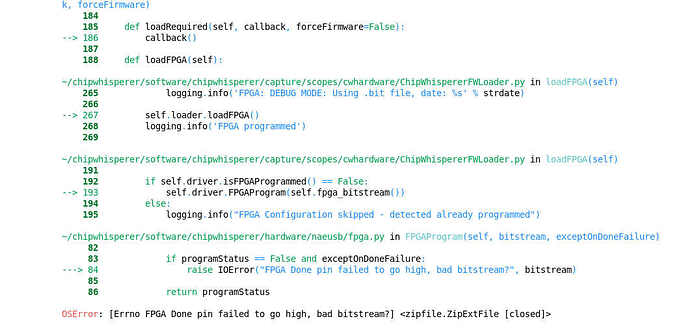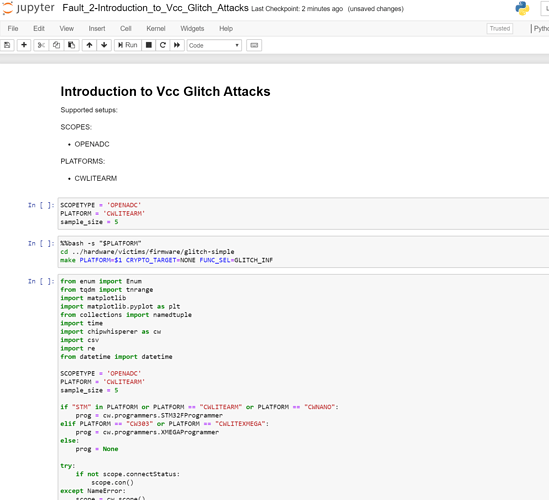USBError Traceback (most recent call last)
~/chipwhisperer/software/chipwhisperer/capture/scopes/openadc_interface/naeusbchip.py in con(self, sn)
86 #sn = None
—> 87 found_id = self.dev.con(idProduct=nae_products, serial_number=sn)
88 except (IOError, ValueError):
~/chipwhisperer/software/chipwhisperer/capture/scopes/cwhardware/ChipWhispererLite.py in con(self, *args, **kwargs)
49 def con(self, *args, **kwargs):
—> 50 return self._cwusb.con(*args, **kwargs)
51
~/chipwhisperer/software/chipwhisperer/hardware/naeusb/naeusb.py in con(self, idProduct, connect_to_first, serial_number)
584
–> 585 self.usbseralizer.open(dev[‘sn’])
586 foundId = dev[‘pid’]
~/chipwhisperer/software/chipwhisperer/hardware/naeusb/naeusb.py in open(self, serial_number)
157 cmdpacket = self.make_cmd(self.OPEN, serial_number)
–> 158 return self.process_rx(self.txrx(tx=cmdpacket))
159
~/chipwhisperer/software/chipwhisperer/hardware/naeusb/naeusb.py in process_rx(self, inp)
150 if resp == self.ERROR:
–> 151 raise payload
152
USBError: [Errno None] None
During handling of the above exception, another exception occurred:
Warning Traceback (most recent call last)
in
229 return result, line
230
–> 231 setup()
232 rejection_builder()
in setup()
69
70 prog = cw.programmers.STM32FProgrammer
—> 71 scope = cw.scope()
72
73 time.sleep(0.05)
~/chipwhisperer/software/chipwhisperer/init.py in scope(scope_type, sn)
209 scope_type = get_cw_type(sn)
210 scope = scope_type()
–> 211 scope.con(sn)
212 return scope
213
~/chipwhisperer/software/chipwhisperer/capture/scopes/base.py in con(self, sn)
56
57 def con(self, sn=None):
—> 58 if self._con(sn):
59 self.connectStatus = True
60
~/chipwhisperer/software/chipwhisperer/capture/scopes/OpenADC.py in _con(self, sn)
201 def _con(self, sn=None):
202 if self.scopetype is not None:
–> 203 self.scopetype.con(sn)
204
205 self.qtadc.sc.usbcon = self.scopetype.ser._usbdev
~/chipwhisperer/software/chipwhisperer/capture/scopes/openadc_interface/naeusbchip.py in con(self, sn)
87 found_id = self.dev.con(idProduct=nae_products, serial_number=sn)
88 except (IOError, ValueError):
—> 89 raise Warning(‘Could not connect to “%s”. It may have been disconnected, is in an error state, or is being used by another tool.’ % self.getName())
90
91 if found_id != self.last_id:
Warning: Could not connect to “NewAE USB (CWLite/CW1200)”. It may have been disconnected, is in an error state, or is being used by another tool.
 “Failed to find USB device”.
“Failed to find USB device”. Erasing it always works, so I guess that this is good news.
Erasing it always works, so I guess that this is good news. Odd that BOSSA did not complain about anything.
Odd that BOSSA did not complain about anything.

